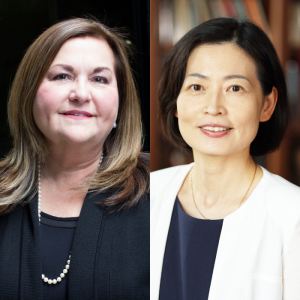Professors selected as fellows of the American Academy of Social Work and Social Welfare for 2024
January 08, 2024 / by Michele Carroll- Research
Two distinguished faculty members of the USC Suzanne Dworak-Peck School of Social Work are selected for induction into the American Academy of Social Work and Social Welfare (AASWSW) for 2024. María P. Aranda, the Margaret W. Driscoll/Louise M. Clevenger Professor in Social Policy and Administration and executive director of the USC Edward R. Roybal Institute on Aging, and Yuri Jang, professor and senior scientist at USC Roybal, receive this prestigious honor at a ceremony in Washington, D.C. on January 13.
The AASWSW recognizes the accomplishments of scholars, practitioners and policy leaders dedicated to achieving excellence in high-impact work to advance social good. Aranda and Jang join a notable group of 15 USC Social Work faculty members who have been inducted as fellows of the AASWSW over the past decade, including current professors Carl Castro, John Clapp, Michàlle Mor Barak and Suzanne Wenzel. USC has one of the largest contingents of AASWSW Fellows, a reflection of its unwavering commitment to scholarship as a top-tier research institution.
Aranda and Jang are social science researchers whose work specializes in marginalized and underserved older adult populations, and both have conducted groundbreaking research for decades in the areas of Alzheimer’s and related dementias, and support for caregivers whose first language is not English. They each bring a passion for bridging health inequities among marginalized communities of older adults and the people who care for them.
"It is truly an honor to be named a fellow of the American Academy of Social Work and Social Welfare,” Aranda said. “The academy is known for its recognition of scholars and thought leaders who have made exceptional contributions to the field and whose collective work is for the good of society. I am honored to be among such distinguished company.”
A world-class scholar and leader, Aranda is a tour de force in elucidating the individual, family, community and societal factors that impact the well-being of adults and their family caregivers living with chronic health conditions, with a particular focus on the Latinx population. Jang’s work focuses on increasing the quality of life for older adults, particularly Asian-American immigrants, using data to correct assumptions and bridge health care equity gaps.
“It is a wonderful culmination of the work that I have been doing and such an honor to be named an AASWSW Fellow,” Jang said. “I am humbled and grateful to my colleagues and the Academy for recognizing my work.”
Aranda has served on several consensus committees for the National Academies of Sciences, Engineering, and Medicine. In this capacity she has provided expertise on the geriatric workforce in mental health and substance use disorders, family caregiving to older adults, financial capacity determination, functional assessment for adults with disabilities, and evidenced-based interventions for persons living with dementia. In 2019, Aranda was appointed by California Governor Gavin Newsom to serve on the Governor's Task Force on Alzheimer’s (Disease) Prevention and Preparedness, chaired by Maria Shriver. The Task Force produced a report of recommendations to improve statewide standards and programs on behalf of close to 700,000 individuals living with dementia in California.
Jang has focused her research on the areas of positive adaptation in aging, health disparities, and minority health and service utilization, including a project on mental health literacy among minority older adults funded by the National Institute of Mental Health and Johnnie B. Byrd Sr. Alzheimer’s Center and Research Institute. She has led a study on telecounseling for linguistically isolated older adults with funding from the Agency for Healthcare Research and Quality, and completed the Asian American Quality of Life (AAQoL) project, sponsored by the City of Austin, Texas, a city-wide needs assessment in Asian American communities. Jang was awarded an R01 grant from the National Institute on Aging to lead a five-year multi-site study, “Limited English Proficiency, Health, and Healthcare among Older Immigrants.”
Caring for the caretakers
In 2019, approximately 16 million family members and friends provided unpaid care to people with Alzheimer’s, totaling more than 18 million hours, with an economic value of $244 billion. Both Aranda and Jang have made caring for caregivers a primary focus of their research, creating or adapting caregiver interventions for specific underserved communities where the need is exceptionally high.
“There are very serious, direct impacts of caregiving on the health and mental health of family caregivers, especially when caring for people living with dementia,” Aranda said. “Caregivers have higher rates of anxiety and depression, mortality, financial stress and poor sleep. They can be at risk for developing dementia themselves.”
Both researchers have independently adapted Savvy Caregiver — the most widely used evidence-based intervention designed to care for the caretakers of individuals with Alzheimer’s — to better meet both the languages and cultures of the communities with which they work, helping to break the bonds of linguistic isolation.
“Language translation is important,” Jang said. “But you have to go beyond that to make cultural adaptations based on the experiences and challenges of real people in the community, how they think and what they recommend for future directions.”
Aranda and Jang are currently exploring opportunities to collaborate and build on their shared scholarship to provide culturally appropriate support for caregivers, and expand the understanding of and appreciation for the full diversity of the older adult experience.
To reference the work of our faculty online, we ask that you directly quote their work where possible and attribute it to "FACULTY NAME, a professor in the USC Suzanne Dworak-Peck School of Social Work” (LINK: https://dworakpeck.usc.edu)
